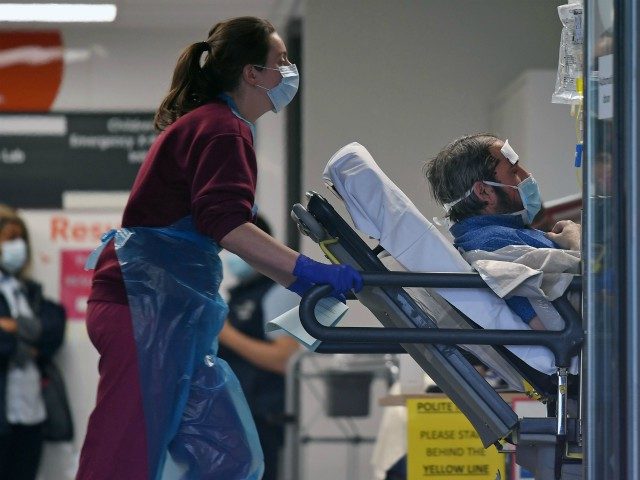University of Pittsburgh Medical Center’s (UPMC) Chief Medical Officer Dr. Steven Shapiro on Wednesday called for Pennsylvania to reopen, laying out statistics showing that the coronavirus pandemic did not overwhelm hospitals in the UPMC system and explaining that “this is a disease of the elderly, sick and poor” and warning that “extended social isolation” cannot continue.
Dr. Shapiro issued the remarks during a roundtable discussion with Sen. Pat Toomey (R-PA) detailing the experiences and findings gleaned from the UPMC hospital system’s battle with the virus.
Shapiro explained that they took steps to prepare for a surge in coronavirus patients by “radically” transforming their hospital operations “to create a safe environment for patients and staff,” delaying non-urgent surgeries, and ramping up telemedicine “38-fold.” While they saw a “steady stream” of patients, a surge never came to fruition. In fact, during the peak, coronavirus patients occupied just two percent of their 5,500 hospital beds and 48 of their 750 available ventilators.
“Subsequently, admissions have been decreasing with very few patients now coming from the community, almost all now being from nursing homes. Of note, in the 36 UPMC-owned senior facilities we have had zero positive cases,” he said, explaining that the outcomes in the hospital system are “similar to the state of Pennsylvania” and noting that the median age of death from the virus in the state is 84-years old.
“The few younger patients who died all had significant preexisting conditions. Very few children were infected and none died. Minorities in our communities fared equally as well as others, but we know that this is not the case nationally,” he continued, adding, “In sum, this is a disease of the elderly, sick and poor.”
He explained that the hospital system is “actively bringing back our patients for essential care following CMS guidelines,” using PPE and testing all, “even asymptomatic, preoperative patients for active viral infection with PCR.”
“To date, 0 out of 1,000 tested positive in western Pennsylvania, New York and Maryland,” he revealed. “Three of 500 are positive in central Pennsylvania. Our community prevalence is low, which we will soon confirm with antibody testing.”
While Shapiro said virus hotspots, like New York, must “open up in a measured step-wise manner with extensive testing, tracing and treatment,” other areas should be able to keep virus rates low as long as vulnerable people, particularly seniors in nursing homes, remain protected. That could buy time for a “potential resurgence as we bolster our supply chain and find effective intervention.”
“COVID-19 is a disease that ravages those with preexisting conditions – whether it be immunosenescence of aging or the social determinants of health,” he reaffirmed.
“We can manage society in the presence of this pathogen if we focus on these preexisting conditions,” Shapiro added.
“What we cannot do,” Shapiro warned, “is extended social isolation,” noting the social makeup of mankind and highlighting the “adverse mental health consequences of loneliness.”
“That is before the much greater effects of economic devastation take hold on the human condition,” he added.
Calling the coronavirus pandemic a “wake-up call for our health care system and our nation in general,” the medical chief said pandemics “will be part of our future, and we must be better prepared” but warned that the country cannot be placed in a position where it has to “choose between death by pathogen or death by our economy.”
He continued:
In this particular case, the problem we’re not going to be able to fix in the short term is the complete eradication of the virus. The problem we can fix is to serve and protect our seniors, especially those in nursing homes. If we do that, we can reopen society, and though infectious cases may rise as in the Theodore Roosevelt, the death rate will not, providing time for the development of treatments and vaccines.
Pennsylvania Gov. Tom Wolf (D) is only allowing 24 counties to move into the “yellow” phase of reopening, effective Friday, May 8. Those include Bradford, Cameron, Centre, Clarion, Clearfield, Clinton, Crawford, Elk, Erie, Forest, Jefferson, Lawrence, Lycoming, McKean, Mercer, Montour, Northumberland, Potter, Snyder, Sullivan, Tioga, Union, Venango, and Warren counties.
On Wednesday, the Keystone State reported less than 1,000 new cases of the virus for the fourth day in a row.
“Trends mean more than any specific day, but it’s starting to form a trend, so I think that that’s very positive news,” Health Secretary Rachel Levine said.
Wolf on Wednesday announced the creation of the “Commonwealth Civilian Coronavirus Corps,” described as a “a public service initiative that will support efforts this fall to increase testing and contact tracing and provide critical new job opportunities in the public health sector.”
“‘The Commonwealth Civilian Coronavirus Corps will serve as a public service program that will expand our ability to conduct contact tracing and testing and mobilize Pennsylvanians to contain COVID-19,” the governor said.

COMMENTS
Please let us know if you're having issues with commenting.